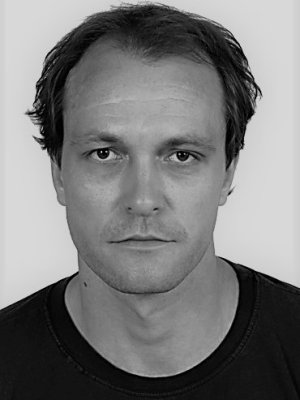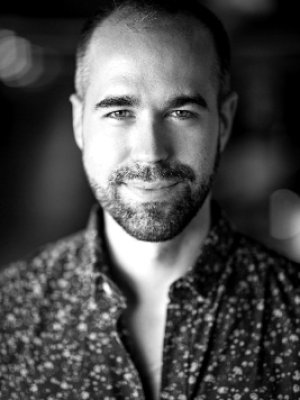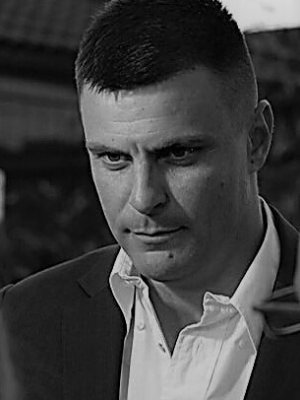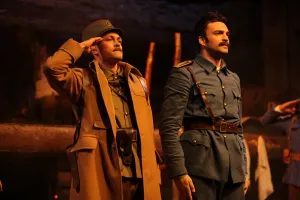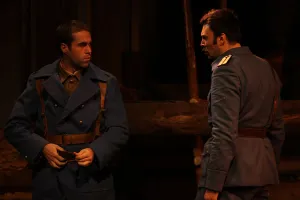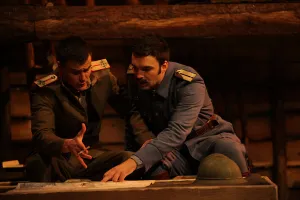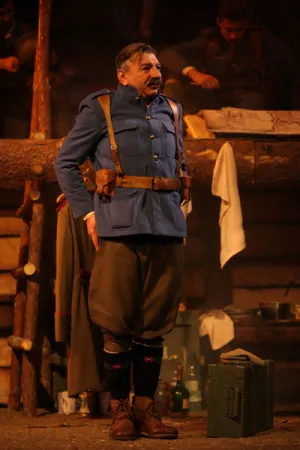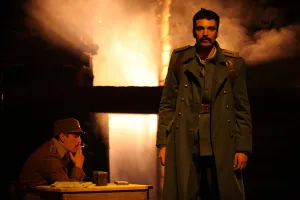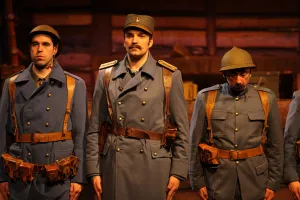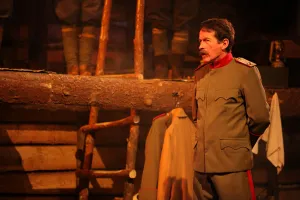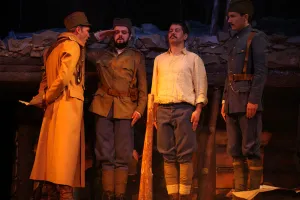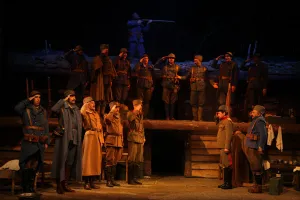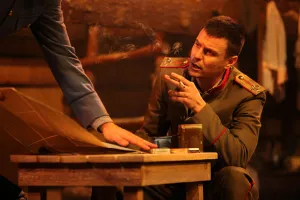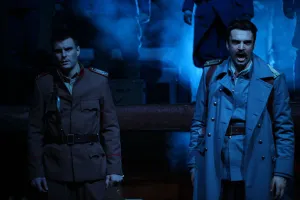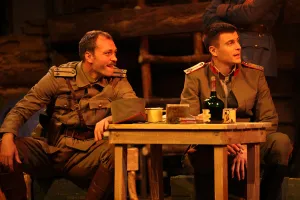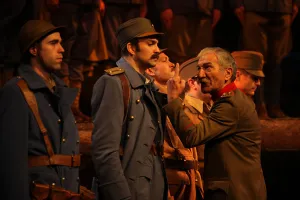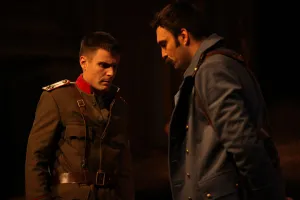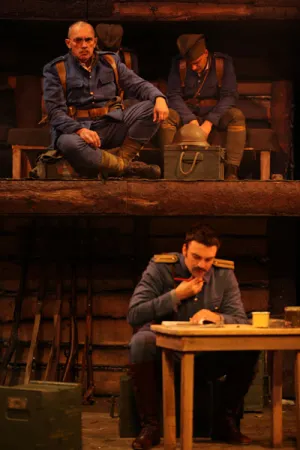Serbian trilogy
M. and S. Nikačević / S. Milanović, after Stevan Jakovljević’s novel

ABOUT THE ADAPTATION
The biggest challenge for everyone that takes on to dramatise a prose piece is not how the material can be transferred from one form into another (it goes without saying that there has to be knowledge about dramatic rules), but how one can discard aesthetically valuable fragments of the text that cannot find their place in a strict dramatic principle that demands continual action on stage. The fact can be substantiated with five dramatisations of novel Death and the Dervish, out of which only the one written by Borislav Mihailović Mihiz is a drama in its true sense. As a renowned literary critic, Mihiz was the only one who had courage to leave out some of the most beautiful poetic places from the novel in order to maintain unity of plot. The Nikačević brothers faced an even more difficult dilemma when they decided to write a drama based on the monumental prose piece by Stevan Jakovljević. Besides aesthetic side, they had to take into account the historical background of Jakovljević’s war memoirs. Before them, they had nine hundred pages organised in three volumes (The Nineteen Fourteen, Under the Cross and The Gate of Freedom), in eighty-four chapters. The novel encompasses all of the important moments of the war – starting from mobilisation, through the first victories, defeats and retreat through Albania, recuperation of Serbian Army on Corfu and its reestablishment in Thessaloniki, fights and victories of the Thessaloniki Front, until the epilogue – account of a visit to Kaimakchalan after the war. Jakovljević’s memories became a literary memory of the whole nation. The writer congratulated the dramatists for their courage to take only one part of the novel for the dramatisation. The Nikačević brothers thus chose only one event to dramatise. It was the attack at Bulgarian trenches in order to destroy cannon merezer at the site called “On Hedgehog’s Back”, named so by the soldiers. They assessed that the chapter from Jakovljević’s novel satisfied the strictest criteria of unity (of plot, time and space). Everything happens in a single day, in the Serbian army trenches and plot runs incessantly. However, the authors could not resist but use two more chapters in the first act – Christ Riseth and Forgive Us – these chapters do not have function of dramatic exposition, instead they give a general impression about Serbian army on the front. The small dramaturgical oversight is understandable: audiences confirmed this with their emotional reaction at the sight of soldiers in Serbian uniforms. Besides veterans, the rest of the audience were people who have all lost somebody dear in the War. Although the dramatists were connoisseurs of dramaturgy (Svetolik was a renowned actor, Miodrag was a writer), they made this necessary compromise because people’s memories of the War were still very much alive at the time. They knew that audience represents a mirror of the ongoing historical moment, as Đerđ Lukač would put it. Today’s audience is a mirror of a different, modern historical moment. Owing to a several decade long suppression of memories about the tragic and glorious days of Serbian army, the modern audience is not aware, in most cases, of basic chronology of the First World War, while the war uniforms are merely museum exhibits for them. Therefore, we needed the adaptation. Adaptation (unlike dramatisation, which is actually play writing based on a literary or verbal material) is done for a specific production that already has its concept. It is more ephemeral text than dramatisation; it is a sort of screenplay for the production. In this case, we decided to keep drama unity of the main event and leave out the first act completely. Besides, intention to place the plot in Serbian army trenches, which turned during the two-year wait for allies’ decision to start the breach of the Front into intricate network of underground passages and hideouts only one hundred meters away from Bulgarian side, demanded that all characters should be on stage all the time. Anonymous Soldier I, Soldier II, or Sergeant I and Sergeant II, Soldier by the rifle loophole, etc, who had a function in the brothers Nikačević’s drama, had to get at least an outline of character. In order to do so, it was necessary to compile various traits of representative characters from the novel and use their words, wherever possible. According to the director’s idea, Soldier-Servant Isailo, who is a young soldier in the novel, needed to become an older man. Such character already existed in Aleksandar Ognjanović’s adaptation done for the Belgrade Drama Theatre’s production in 1969, where he was named Živorad. We took over the character from Ognjanović’s adaptation, together with the name and his lines (although in slightly changed dramatic situations). We did the same with a scene that served to define the time of the Battle of Kaimakchalan precisely in the chronology of the War (which most viewers probably are not aware of); for this purpose, we used fragments from the novel The Wings by Stanislav Krakov. For the same purpose, we also used parts of commands, reports and other historical documents, in order to stress important decisions and dates in chronology of the War. The brothers Nikačević’s drama was titled On Hedgehog’s Back. At the time when it was written, the people could have known the meaning of the phrase forged by the soldiers as a metaphor to signify dangers of being at the most dangerous place on the Front. On our premiere, there will be no veterans from the Great War in audience; for modern viewers, this title would be confusing; it would even be misleading regarding the genre of the production. Therefore, we decided to use the title of The Serbian Trilogy, although the production covers only one of eighty-four chapters in Jakovljević’s novel. We hope that the production would make the viewers, young ones predominantly, read the rest of the chapters from one of the most important historical novels in Serbian literature, which at the same time represents an authentic account about tragedy and renaissance of the Serbian Army in the Great War.
Slavko Milanović
Authors of Dramatisation
MIODRAG AND SVETOLIK NIKAČEVIĆ
Svetolik Nikačević (1905, Banja Pribojska – 1987, Belgrade) was one of the most popular actors in period between the two world wars. Prior to the Second World War, his acting reached high artistic level by means of his creative force, beauty and splendour of his gift. He possessed the best qualities for interpreting drama heroes – he was very handsome, his speech was flawless (he was one of few Belgrade actors whose speech was perfect); he won appreciation both with audiences and critics. In 1922, he started acting in the National Theatre in Skopje, after having graduated from Postal and Telegraph School and Trade Academy. In period between 1926 and 1928, he was a permanent member of the Serbian National Theatre in Novi Sad where he achieved his first successes. In 1928, he came back to Skopje, where he stayed until 1935, and then he transferred to the National Theatre in Belgrade. During the first years of the Second World War, he was a captive in prisoners’ camps in Germany and Italy, and in 1943, he ran away and found refuge in Switzerland. After the war, he moved to South America and came back to Belgrade in 1965. For a short time, he was engaged in the Contemporary Theatre and in Yugoslav Drama Theatre, and eventually he rejoined the National Theatre – from 1968, until 1977 when he retired. During the First World War, Svetolik and his brother Miodrag (1899, Sredska, Prizren – 1981, Belgrade) went via Thessaloniki to France, where they both got education in Aix-en-Provence and Beaulieu. The brothers were well educated and spoke several languages; therefore, they expressed their literary affinities by translating, writing reviews, essays, short stories, historical studies, memoirs… and very successful dramatisations.
Olga Marković
From: Epilogue – On Hedgehog’s Back, MPUS, Belgrade, 2004
 STEVAN JAKOVLjEVIĆ, Chronology
STEVAN JAKOVLjEVIĆ, Chronology
1890 On 7th December, Stevan Jakovljević was born in Knjaževac. He finished primary school in Knjaževac and then he graduated from the Grammar School in Kragujevac.
1913 He graduates at the Department of Biology at the Faculty of Philosophy in Belgrade.
1914 He goes to the Great War as a reserve officer.
1919 After four years of fighting in the War, he is discharged from the army and he finds his first job – at the beginning, he is an assistant professor; but later on, he works as a professor in Kragujevac Grammar School.
1922 He transfers to Belgrade, where he works as a professor in the IV Men’s Grammar School. The same year, he starts publishing first scientific works on experimental plant morphology. At the end of the year, he is elected an Assistant Professor at the Department of Botanic of the University of Belgrade.
1925 He becomes a PhD.
1929 Becomes a Docent at the University of Belgrade.
1934 The Nineteen-Fourteen, the first volume of his war chronicle is published. The same year, he becomes a university Professor without tenure.
1935 Under the Cross, the second volume of his war chronicle is published.
1936 The Gate of Freedom, the third volume is published.
1937 The Serbian Trilogy, the three volumes are published as a trilogy.
1938 Receives a tenure as a Professor at the University of Belgrade.
1939 He publishes a contemporary novel on life in Belgrade, The Change of Generations.
1941 During the short April War, Germans imprison him and he remains captive in a concentration camp for four years.
1946 He becomes a Rector of the University of Belgrade.
1952 The Second World War chronicle, The Great Confusion, is published.
1956 Faces in Shadows, a novel on life in a concentration camp is published.
1962 Stevan Jakovljević dies in Belgrade.
Taken from: Stevan Jakovljević, The Serbian Trilogy, Prosveta / Obod, 1976
 SLAVENKO SALETOVIĆ BIOGRAPHY
SLAVENKO SALETOVIĆ BIOGRAPHY
Slavenko Saletović is a Professor of Theatre Directing at the Department of Theatre and Radio Directing at the Faculty of Dramatic Arts, University of Arts in Belgrade. He won the May Award of the City of Belgrade when he was still a student. In season 1973/74, he worked as a stage director in the Drama Company of the Serbian National Theatre in Novi Sad. As of 1st April 1974, he received tenure at the Faculty of Dramatic Arts in Belgrade. He has been the Head of Department of Theatre and Radio Directing for a long time and he served two terms of office as an associate dean at FDA. He served a two-year term in office (1999 and 2000) as a pro-rector of the University of Belgrade. He also worked as a chairperson of the Council of FDA; and currently he is a chairperson of the Council of the University of Arts in Belgrade. In 2009, he was awarded with the Grand Plaque with Charter of the University of Arts in Belgrade. Saletović produced about 100 plays in theatres in Novi Sad, Sarajevo, Sombor, Tuzla, Šabac, Kragujevac, Zrenjanin, Zaječar, Leskovac, Niš, Pirot, Tršić, Tivat, Užice, Herceg Novi and Belgrade. He directed twelve TV films and TV dramas for Television Belgrade. Saletović won the most prestigious award in his profession, the “Bojan Stupica” Award for best directing of a theatre production in Serbia (for period between 2005 and 2007). Besides this one, there were numerous other awards and recognitions awarded to him, his theatre productions and films. Some of those awards are the following:
- Three awards for directing at the “Joakim Vujić” Serbian Theatres Festival;
- The Theatre Production of the Year 1989 Award (according to votes of Yugoslav theatre critics – opinion poll organised by NIN Magazine);
- Three awards at the Sterijino Pozorje Festival in Novi Sad;
- “Miodrag Petrović Čkalja” Award;
- Two “Jovanča Micić” Awards and seven “Turkey” Awards at the Days of Comedy Festival in Jagodina;
- Award for Best Production at the Festival of Cervantes in Mexico;
- Award for Best Production at the “Zoran Radmilović” Festival in Zaječar;
- Award for Best TV Film at Yugoslav Television Festival in Neum;
- Award at the International Festival of Television in Plovdiv;
- Award for Best Production at JoakimFest in Kragujevac;
- Awards at the Festival of Short Forms in Sarajevo and Days of Comedy Festival in Bijeljina.
Premiere performance
Premiere, November 22, 2014 / Main Stage
Stage Director Slavenko Saletović
Dramatised by Miodrag and Svetolik Nikačević after The Serbian Trilogy novel
Adaptation Slavko Milanović
Dramaturge Slavko Milanović
Set Designer Boris Maksimović
Costume Designer Katarina Grčić Nikolić
Language adaptation and editing Ljiljana Mrkić Popović, PhD
Stage Movement Ferid Karajica
Music by Miroljub Aranđelović Rasinski
Sound design by Vladimir Petričević
Premiere Cast:
Stojanović, Captain, Commander of the Special Unit Vuk Kostić
Stevan, Second Lieutenant of the Artillery Ivan Bosiljčić
Kosta Turčin, Lieutenant, Artillery Vuk Saletović
Rajko, Lieutenant Bojan Krivokapić
Dragan, Sergeant Pavle Jerinić
Živorad, Soldier-Servant Milenko Pavlov
Colonel Radovan Miljanić / Boško Puletić
Svetozar, Corporal Andreja Maričić
Trajko, Private Zoran Ćosić
Milosav, Private Slobodan Stepić
Stanoje, Private Miloš Đurović
Andra, Private Stefan Buzurović
Radoslav, Junior Sergeant Ivan Zablaćanski
Spasoje, Private Vahid Džanković
Flute-Player Borisav Miljković
Jew’s Harp Player Nikola Radeka
Producer Nemanja Konstantinović
Assistent Producer Kristina Obradović
Stage Manager Đorđe Jovanović
Prompter Danica Stevanović
Assistant Set Designer Tijana Trailović
Assistant Costume Designer Ružica Ristić
Make-Up Dragoljub Jeremić
Light Operator Miodrag Milivojević
Set Crew Chief Zoran Mirić
Sound Operator Perica Ćurković
SET AND COSTUMES WERE MANUFACTURED IN THE NATIONAL THEATRE WORKSHOPS








